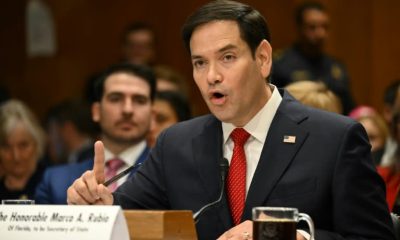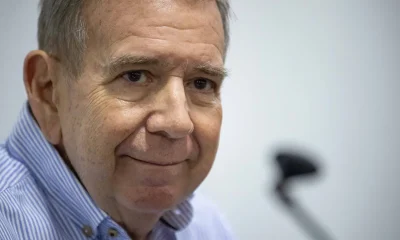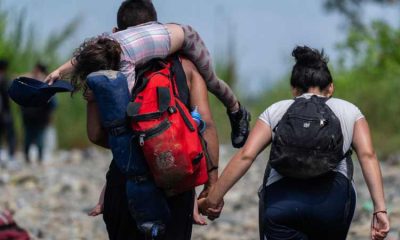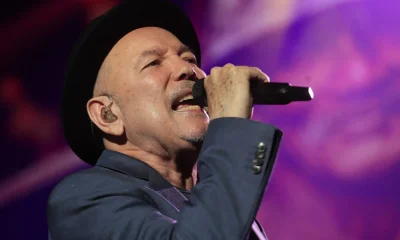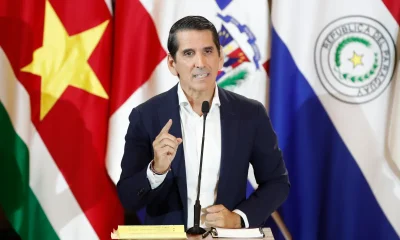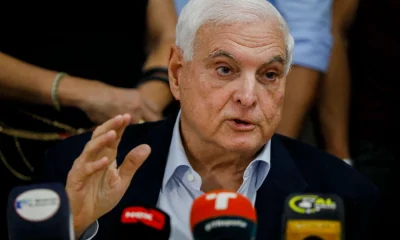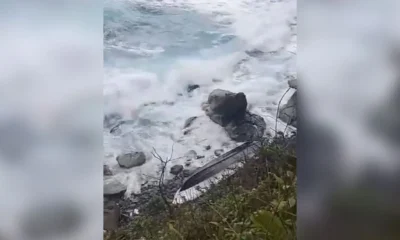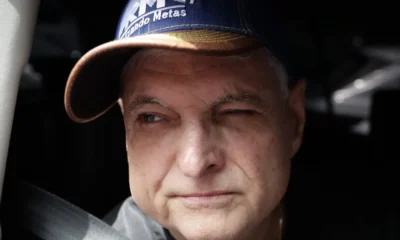Central America
Panamanian government is being asked to review mining contract
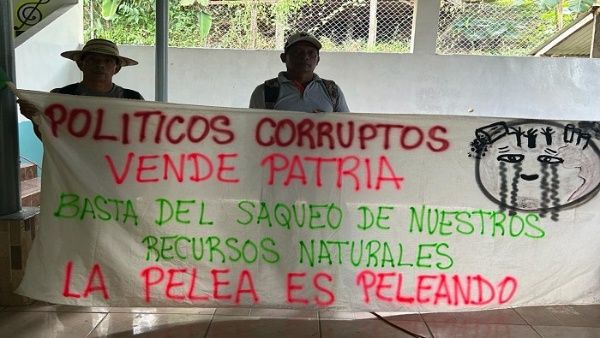
September 7 |
Inhabitants of communities in the Omar Torrijos Herrera district, in the province of Colon, northern Panama, demanded Wednesday that improvements be made to the contract between the Panamanian State and the transnational company Minera Panama and that local suppliers be taken into account.
During the consultation of the contract with the communities, organized by the National Assembly, residents of the community of Coclesito stated that the relationship with the mining company has produced improvements in income and infrastructure.
However, one resident, Abel Oliveros, asked the Minister of Commerce and Industries, Federico Alfaro, to review the mining contract because there are concepts, such as “expropriating land”, which make the residents vulnerable. He added that for decades the Panamanian government never took their opinions into account.
Another resident of the area and local service provider for the mine, Noemí Solís, stated that the communities around the mining project have the right to develop. She stressed the need for the mining company to prioritize local suppliers and offer them opportunities to grow. He explained that “there are people with the capacity and interest” and that the communities need to receive investment and resources.
Discussions with communities on Bill 1043, organized by the Parliament’s Trade and Economic Affairs Committee, have already been held in the Donoso district of Colon. After finishing in Coclesito, it is planned to move to the district of La Pintada, in the province of Coclé, south of Coclé.
Once the opinion of the people has been gathered, the first debate of the document will take place in said commission before sending it to the Plenary of the National Assembly.
Last Tuesday, protests were registered in different points of Panama against the referred contract, which would protect the exploitation of copper by the Canadian mining company First Quantum Minerals LTD. In the opinion of the demonstrators, the contract imposes a colonialist relationship on Panama and would validate the plundering of its natural resources. On the other hand, they denounced that the consultations with the communities are not binding.
Central America
Washington Imposes Visa Ban on La Modelo Director Amid Crackdown in Nicaragua

The United States government announced Wednesday that it has imposed visa restrictions on Roberto Clemente Guevara Gómez, director of Nicaragua’s largest prison, La Modelo, for his involvement in actions that violate human rights.
In a statement, U.S. Secretary of State Marco Rubio said the measure is intended to promote accountability for abuses committed under what he described as the “Murillo-Ortega dictatorship” against political prisoners.
Rubio specified that Guevara Gómez was designated for participating in “a gross violation of the human rights of a political prisoner.” The sanction was issued under the 2024 Department of State, Foreign Operations, and Related Programs Appropriations Act, which bars the sanctioned individual — and potentially immediate family members — from entering the United States.
“United States demands the immediate and unconditional release of all political prisoners unjustly detained in Nicaragua,” the statement added.
Ongoing tensions between Washington and Managua
Washington rejected Nicaragua’s November 2021 elections, in which President Daniel Ortega and his wife, now co-president Rosario Murillo, were reelected while seven potential challengers were in prison.
Relations between the two countries remain tense amid expanding U.S. sanctions and increasing diplomatic pressure on the Nicaraguan government.
On January 10, marking Ortega’s 19 years in power, Nicaragua released “dozens of detainees,” including political prisoners. The move came one day after the U.S. Embassy in Managua stated that “more than 60 people” remain “unjustly detained or disappeared” in the Central American nation.
U.S. officials have continued to push for the “unconditional release” of political prisoners rather than selective or temporary releases.
Ortega, 80, governs alongside Murillo with consolidated authority, having strengthened executive power through constitutional reforms and security measures, while the opposition has been weakened by imprisonment, exile, and the revocation of citizenship and property rights.
Central America
Guatemala’s Attorney General Consuelo Porras Loses Bid for Constitutional Court Seat

Guatemala’s attorney general, Consuelo Porras, who has been sanctioned by the United States over corruption allegations, lost a key vote on Monday in which a public university selected two of the 10 magistrates for the country’s highest constitutional court. However, she could still seek a seat through another nominating body.
The election of five full magistrates and five alternates to the Corte de Constitucionalidad (CC) is taking place gradually over more than two months and is considered crucial in the ongoing struggle for control of Guatemala’s judiciary, which critics say has long been influenced by a political and economic elite accused of corruption.
According to results announced at a press conference, the governing council of the Universidad de San Carlos de Guatemala (USAC) rejected Porras, who had applied as either a full or alternate magistrate, and instead chose two candidates aligned with the university rector. The vote was held at a hotel in Antigua, about 35 kilometers from the capital.
Despite the setback, Porras — whose term as attorney general ends on May 16 — could still be nominated to the Constitutional Court by the Corte Suprema de Justicia, which appoints two magistrates. The remaining six are selected by the president, the bar association and Congress.
“It’s always a possibility,” the 72-year-old lawyer said days earlier when asked by reporters whether she would seek nomination through another institution if she lost the USAC vote.
Porras has been sanctioned by Washington and the European Union for allegedly attempting two years ago to block the inauguration of President Bernardo Arévalo and for pursuing legal actions against anti-corruption prosecutors, judges, journalists and social leaders since taking office in 2018.
The USAC vote was controversial because most members of the university’s governing council are serving beyond the expiration of their terms. Students, academics and social activists staged protests against Porras’ candidacy.
Central America
Teens visit ETESAL substation to learn about responsible energy use

Within the framework of World Energy Day, teenagers from the institutional care center Ciudad Niñez y Adolescencia (CNA), run by the Consejo Nacional de la Primera Infancia, Niñez y Adolescencia (Conapina), took part in an educational visit to a substation operated by Empresa Transmisora de El Salvador (ETESAL) in Santa Ana.
The aim of the activity was to give participants first-hand knowledge of how the country’s electricity transmission system works and to highlight the importance of responsible energy use.
During the tour, the group learned about the process that delivers electricity to homes, businesses, and industries. They were also introduced to specialized technical equipment and the safety measures required to ensure an efficient and reliable service.
Before the guided visit, the teenagers attended two informative talks and an environmental awareness session focused on the relevance of responsible energy consumption and its impact on the environment.
According to Nelson Menjívar, head of Conapina’s programs unit, the initiative serves a dual purpose. “It has two objectives: a recreational component and an educational one, so that adolescents can learn about the work carried out by ETESAL and how some of the resources they use at home are generated. This is in keeping with the guarantees established under the Crecer Juntos law; we ensure those rights for children,” he said.
Menjívar stressed that these activities help young people better understand how essential services function in their daily lives while promoting efficient consumption habits and a culture of environmental respect and care.
The event is part of the principle of shared responsibility set out in the Crecer Juntos law, promoted by the administration of Nayib Bukele, which states that families, society, private companies, and the State must work together to safeguard the comprehensive well-being of children and adolescents.
-

 International1 day ago
International1 day agoFamily of “El Mencho” Seeks Return of Body After Deadly Military Operation
-

 International1 day ago
International1 day agoLarry Summers Steps Down from Harvard Role Amid Epstein Controversy
-
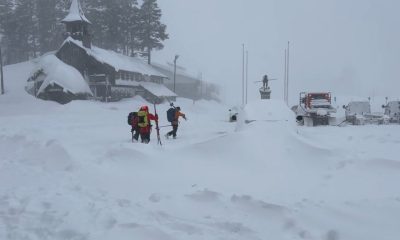
 International5 days ago
International5 days agoNinth Victim Recovered After Deadliest U.S. Avalanche in Decades
-

 International3 days ago
International3 days agoOver 40 Million Affected by Major Snowstorm in Northeastern U.S.
-

 International1 day ago
International1 day agoIran’s President Optimistic Ahead of Geneva Nuclear Talks with U.S.
-

 International1 day ago
International1 day agoBill Gates Admits “Serious Mistake” Over Epstein Ties
-

 International1 day ago
International1 day agoStephen Hawking Photo Appears in Newly Released Epstein Documents
-

 International3 days ago
International3 days agoNine People Killed in Two Armed Attacks in Manabí, Ecuador
-

 International7 hours ago
International7 hours agoCocaine Production Surges 34% in 2023 as Market Expands into Africa and Asia
-

 International7 hours ago
International7 hours agoFederal Judge Blocks Trump Policy Allowing Deportations to Third Countries
-

 International7 hours ago
International7 hours agoClinton Accuses Republican Committee of Using Epstein Case to Shield Trump





























